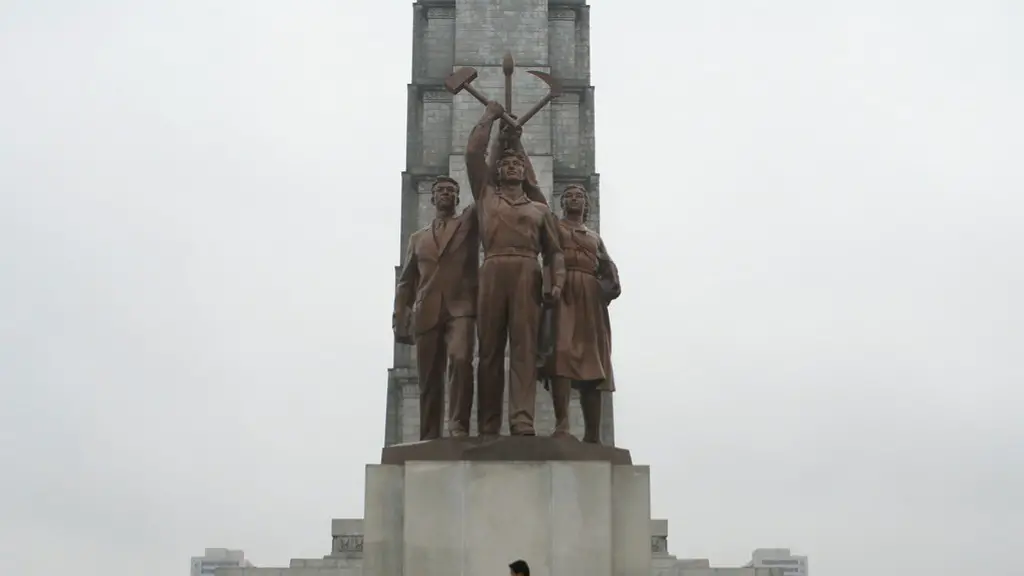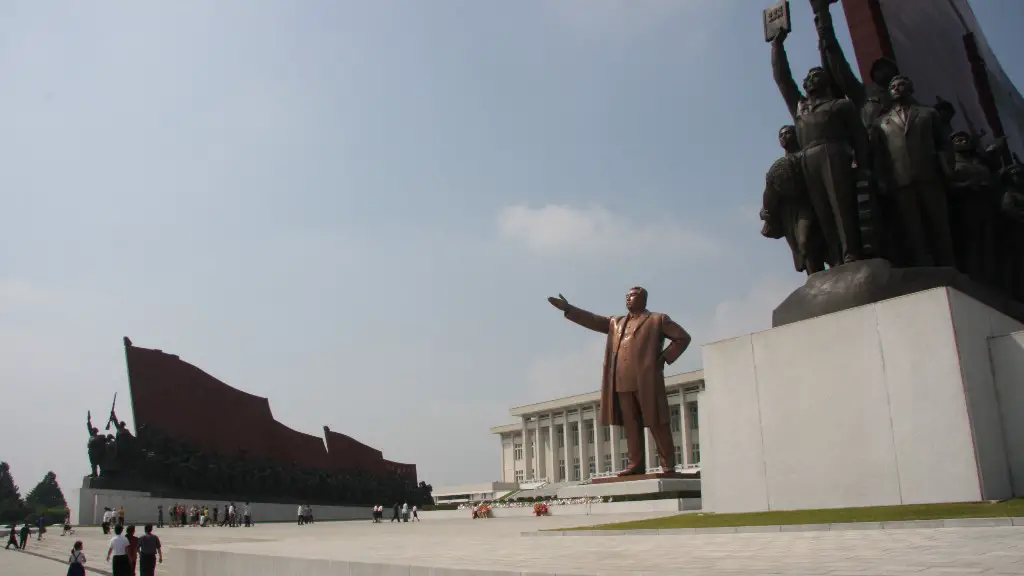Communism in North Korea
North Korea officially became a communist country in 1948. After being occupied by the Soviets during World War II, the Korean War broke out, splitting the Korean peninsula into two. The pro-Soviet North became a communist state, backed by the Soviet Union, whilst the pro-American South remained a Republic under US protection.
The transition to communism in North Korea happened within the decades-long struggle between capitalism and socialism in the Korean peninsula. It was also part of the Cold War era, when there were two rival power blocks – the Western bloc (the US and its allies) and the Eastern bloc (the Soviet Union and its allies).
At the same time, the Korean people were divided by ideology. Pro-communist groups were influenced by the Soviet Union, whilst the pro-capitalist groups were influenced by the US. This lead to the Korean War – a fight between these two rival ideologies and their respective supporters.
In the aftermath of the war, North Korea was left with a devastated economy. The country opted for a Stalinist-type of socialism, which combined socialism with a centrally planned economy. This allowed the state to gain total control over the economy, industry, and labor force.
The communist government also implemented oppressive policies designed to establish a single-party state and to control the people. This included limitations on personal freedoms and expression, a lack of independent media, and harsh restrictions on any political dissent or criticism.
Despite this, the North Korean communist system seemed to have achieved a degree of economic, political and social success. It managed to develop a country from a ravaged and impoverished state to an industrialized and economically powerful nation. This was thanks to North Korea’s large investments in infrastructure, heavy industrialization and centralized planning.
Effects of Communism in North Korea
The impact of communism in North Korea has been a controversial topic. On one hand, the country’s economy has grown and North Koreans have been able to benefit from advances in technology and industry. On the other hand, this growth has been achieved at the expense of human rights and civil liberties.
Under the communist rule, North Korea has become one of the most isolated countries in the world. Travel to abroad is restricted for all citizens, information about the outside world is carefully controlled, and contact with foreigners is kept to a minimum. This is due to the government’s fear of any opposing thoughts or ideas from reaching its population, and its refusal to accept any change from its isolationist policies.
Furthermore, the totalitarian regime has a policy of restricting basic human rights and freedoms, such as freedom of expression, association and assembly. In addition, there is a distinct lack of an independent media. The government regulates all information and sources of media, and any independent media or information is heavily suppressed.
The country also has a highly oppressive labor system. Many North Koreans are forced to work in prison-like labor camps with little to no pay, and often horrific living conditions. The government also engages in a system of public surveillance, with informants providing information on any opposition to state authorities.
North Korea Today
Today, North Korea is still a communist country and is one of the most reclusive countries on the planet. It remains a powerful and militarized state, possessing nuclear weapons and hostile relations with most of its neighbors.
The country is also known for its cult of personality surrounding the ruling Kim family. Its current leader, Kim Jong Un, embraces and embodies the state’s ideology of national self-reliance, known as “Juche”. This ideology combines elements of communism and nationalism, and its primary goal is to maintain the social and political order that exists in North Korea today.
The current regime has maintained its control over North Korean citizens through its oppressive policies. Travel abroad remains heavily restricted, information is carefully censored, and public surveillance is widely practiced. Despite the regime’s efforts, however, North Korean citizens still have access to information about the outside world, and this has caused a rise in anti-government sentiment amongst the population.
International Relations
North Korea’s international relations are largely based on its ideology of self-reliance. This has led to the country becoming a member of numerous international organizations – the United Nations, the Non-Aligned Movement, the International Atomic Energy Agency, and the Shanghai Cooperation Organization, among others.
The country also has close ties with its allies – mainly China and Russia. This has allowed North Korea to engage in economic and military cooperation with these countries, which has been essential for its economic and military development. North Korea also has diplomatic and cultural links with other countries, such as India and the Two Koreas, which are important for its international relations.
However, North Korea’s hostile foreign policy and its nuclear weapons program have led to many international disputes, particularly with its neighbor South Korea, and with the United States. Its refusal to cooperate with the international community and its disregard for international standards and conventions have resulted in numerous diplomatic sanctions and economic embargoes.
Despite its international isolation and hostile relations with the United States, North Korea has recently sought to restore relations with the West. This led to a historic summit between North Korean leader Kim Jong Un and the US President*, Donald Trump, in 2018. The two leaders agreed to denuclearization and the start of a new era of peace and cooperation.
Conclusion
North Korea’s transition to a communist state in 1948 was part of an ideological struggle between capitalism and socialism in the Korean peninsula. Seventy years later, the country is still ruled by a communist regime, which is both praised for its economic successes and criticized for its oppressive policies.
Today, North Korea’s international relations remain complicated by its controversial nuclear weapons program and hostile foreign policy. Although it remains an isolated nation, it has recently begun to explore better ties with the West, resulting in diplomatic talks between North Korea and the United States.
The future of North Korea’s regime remains uncertain, with many believing that the country is ready to move away from its communist regime and open itself up to the global community. Only time will tell how North Korea will evolve in the coming decades.
History of Communism in North Korea
The history of communism in North Korea is one of struggle and conflict. The Korean War not only left a physical scar on the country but it also led to a political and ideological divide.
The seeds of communism in North Korea were planted by the Soviet Union, which dominated the region in the aftermath of the War. As a result, many pro-communist ideologies were implemented and enforced. This eventually led to the creation of a powerful state-controlled economy and the consolidation of the political system under Kim Il Sung.
The communist government also began to implement a variety of oppressive policies to control the people. This included the strict limitations on personal freedoms and expression, the lack of an independent media, and the harsh punishments for any political dissent or criticism.
Kim Il Sung’s successor – his son, Kim Jong Il – continued these policies and the government-controlled economy. Kim Jong Il also adopted his own ideology, known as songun or military-first politics, which focused on the country’s military power.
Socialism in North Korea
North Korea adopted socialism with a centrally planned economy as an economic system. This has allowed the state to gain total control over the economy, industry, and labor force. The North Korean socialist economy was heavily reliant on the Soviet Union for aid and assistance – this economic aid immensely contributed to North Korea’s economic development in the early years of its existence.
The socialist system in North Korea also introduced a variety of policies and programs to help the people. These included free education, free healthcare, and free housing for all citizens. In addition, the government implemented public welfare programs such as food subsidies and public health and safety initiatives.
The North Korean government also sought to ensure employment for all citizens by creating and maintaining many state-owned factories and enterprises. The state also introduced a system of worker incentives to reward hardworking employees.
However, in recent years, the North Korean socialist economy has come under increasing strain. Years of economic sanctions have taken a toll on the economy, leading to shortages of food and other essentials. In addition, the government has reduced or eliminated many of its welfare programs. This has resulted in rising poverty and economic hardship for many North Koreans.
Relations between North and South Korea
Relations between North and South Korea have been strained for decades. Their history is marked by hostility and mistrust, with both sides viewing the other as an ideological enemy.
The ongoing tensions between the two Koreas are rooted in the Korean War. During the War, the two sides fought over the ideological divide between capitalism and communism. This divide, which led to the establishment of two separate nations, is still clearly visible today.
In recent years, however, both Koreas have sought to mend the rift between them. This has culminated in a historic summit between North Korean leader Kim Jong Un and South Korean President Moon Jae In in 2018. This summit signified the start of a new era of reconciliation and cooperation between the two countries, leading to a series of steps forward towards peace and unity.
Despite these positive developments, the two Koreas remain divided. The legacy of the War is still very much alive in the minds of many Koreans, and it will take time for them to overcome their differences and fully reconcile.
Foreign Policy of North Korea
The foreign policy of North Korea has long been hostile and confrontational. The country has had a long-standing tradition of opposing the West and supporting its allies. This policy is based on the ideology of self-reliance and resistance to external interference.
North Korea’s primary goals are to maintain its current political and social order, and to protect the state’s sovereignty and autonomy. In line with this goal, the country has been involved in numerous international disputes and conflicts, particularly with the United States.
The country also views nuclear weapons as an essential tool for protecting its sovereignty and autonomy against external threats. This has resulted in numerous sanctions and embargoes from the international community.
In recent years, however, North Korea has sought to restore better relations with its neighbors and the West. This has led to the historic summit between Kim Jong Un and Donald Trump in 2018, and the start of a new era of peace and cooperation in the Korean peninsula.


